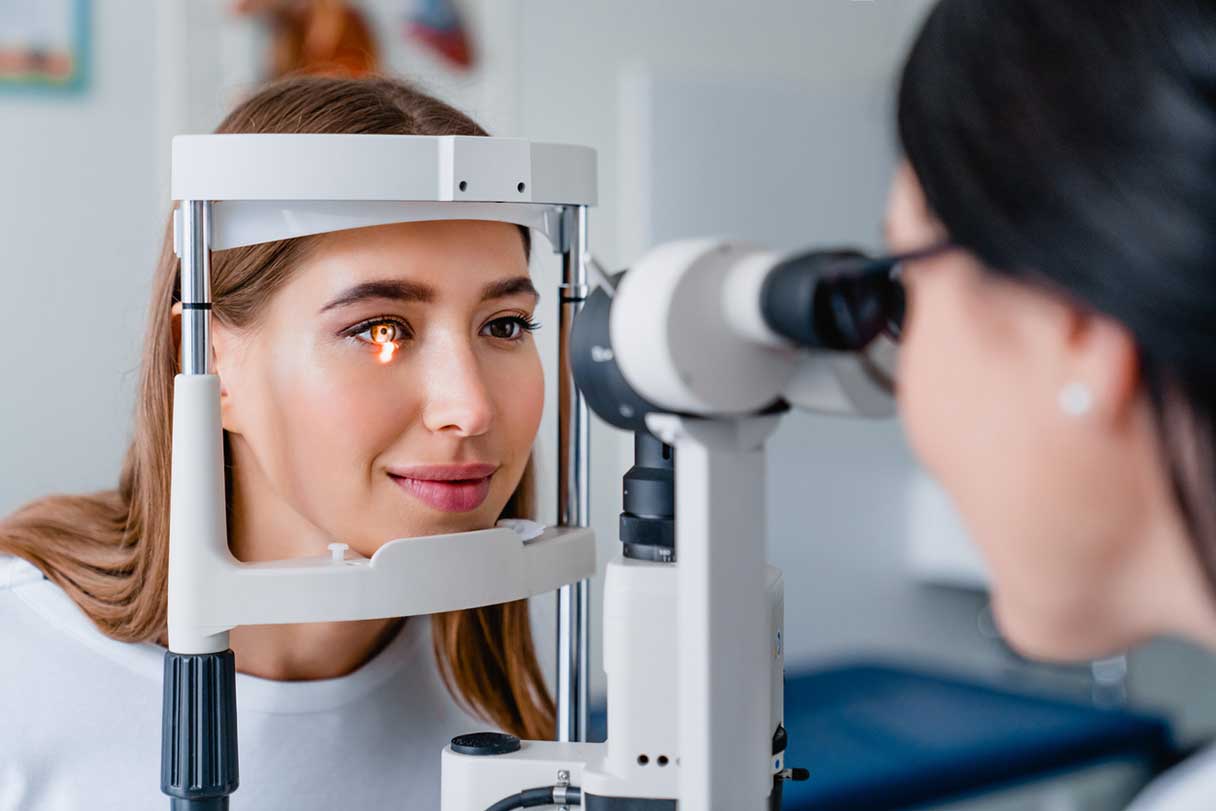If you're considering life without eyeglasses, contact lenses and LASIK eye surgery are two popular options to help you see clearly. But how do you decide which vision correction choice is best for you?
Both options have advantages, and it's important to consider how each would impact your lifestyle. Let's take a closer look at these two vision solutions.
How Do Contact Lenses Work?
Contact lenses are medical devices worn directly on the cornea of the eye to help correct refractive errors, which is when the eye does not refract (meaning bend or focus) light properly into the eye, resulting in a blurry image.1 They can help correct the same vision problems that glasses do, such as nearsightedness (myopia), astigmatism (distorted vision), farsightedness (hyperopia) and the need for bifocals (presbyopia).1
In general, if you're a good candidate for contact lenses, your eye doctor will walk you through the pros and cons of soft contact lenses, as well as “hard" or “rigid" gas-permeable lenses.
There are a number of benefits to using contact lenses, and eye doctors find that many people are good candidates for using corrective lenses, particularly if they wear glasses all or most of the day and want to ditch them for aesthetic reasons or practicality.
Pros and cons of contact lenses:2
- A wider field of view
- May be a more practical choice when playing certain kinds of sports
- Can reflect one's personal aesthetic
- Can take time to get used to
- You'll need to be prepared with a backup solution should one rip or fall out.
- They might dry out eyes.
- They can be costly to pay for daily, weekly or monthly prescriptions.
- Can become irritated if you're susceptible to allergies
- If you get something in your eye, you'll need to clean the lens.
- Risks of eye infections if you're sick or you touch an infected surface and then your eye
How Much Do Contact Lenses Cost?
The cost of contact lenses varies based on how much your insurance covers, the type of prescriptions, the contacts you selected and where you purchase them. On average, contact lenses cost $185 to $335 per year. But depending on what kind of contacts you buy, the cost can vary from $150 to $1,500 annually.3
Cost of soft contact lenses
Whether you're tossing them out daily, weekly or monthly, the cost of an annual supply of soft contact lenses can vary. It's also important to note that multifocal, bifocal and astigmatism lenses will cost more than single-vision lenses.
- Daily disposable contact lenses (dailies): $440 to $760, annually4
- Two-week disposable contact lenses (biweekly): $200 to $440, annually4
- Monthly disposable contact lenses: $180 to $380, annually4
- Yearly soft contact lenses: $50 to $200, annually4
Cost of hard or rigid contact lenses
The costs of hard, gas-permeable contact lenses and other custom contacts vary, too. The average cost of gas-permeable hard contact lenses is around $200 for a set of two lenses, but will vary based on the prescription your doctor writes you. The price of hard contact lenses can range from $150 to $650 for a pair. Each pair should last for one year.
Cost of specialty contact lenses
Your vision care provider may recommend specialty lenses to treat different types of eye problems. Or, you may want special decorative lenses — like colored contact lenses — to change the look of your eyes. The prices you can expect to pay will depend on your insurance coverage and prescription.
- Thirty-day extended wear contacts cost around $90 to $520 per year.
- Orthokeratology (ortho-k) contact lenses correct vision problems slowly and can cost between $1,000 and $4,000 for lenses and fittings.
- Scleral contact lenses are large, gas-permeable lenses that can cost three to four times the cost of traditional lenses. In complex cases, the price of a scleral contact lens can run as high as $4,000 per eye or more.
- Hybrid contact lenses cost around $500 to $1,000, annually.3
How Does LASIK Eye Surgery Work?
LASIK is a vision correction surgery developed to improve the cornea's ability to refract or focus light. LASIK stands for “laser-assisted in situ keratomileusis."5 LASIK reshapes the cornea so light enters it properly and follows the correct path to your retina. It's considered a cosmetic surgery with a 95% success rate.6
LASIK can be done on one or both eyes during the 30-minute appointment, and most people return to work and driving within a few days after LASIK.5 You might be a good candidate for LASIK surgery if you're over age 18 and interested in correcting farsightedness, nearsightedness or astigmatism.
In general, LASIK is considered a safe eye surgery. It can result in 20/20 vision for 90% of people who have the surgery, after the eyes have completely recovered in a few weeks.
Dry eye is the most commonly reported side effect of LASIK eye surgery. Some other side effects include blurred vision, sensitivity to light, reduced night vision, starbursts or glare around lights, as well as tiny red or pink spots on the whites of the eyes.5
How Much Does LASIK Eye Surgery Cost?
The cost of LASIK eye surgery varies greatly, and in most cases, it is not covered by health insurance. In the U.S., the cost of LASIK is anywhere from $1,000 to $3,000 per eye.6 That can be an expensive cost to take on out of pocket.
It's also important that you factor the following into the cost of LASIK:7
- Pre-operation and post-operation exams
- Any facility and surgeon fees that might be tacked on
- Eye drops to prevent infection after the operation
- Time off from work
This elective surgery can be managed through Health Savings Accounts (HSAs), Flexible Spending Accounts (FSAs) or financial planning options.
Weighing the Options
Talk with your vision care provider about what they think the best solution is for your particular vision problems and lifestyle. If the idea of popping contact lenses in your eyes daily for the rest of your life and traveling with storage cases, solution and backup lenses feels tedious to you, then eye surgery like LASIK could be the vision correction option that best suits your lifestyle.
Your optometrist might also factor in your age, eye health and prescription, as well as your family health history, and suggest that contact lenses are the better solution if you aren't a good candidate for LASIK. Your eye doctor should be able to help you make the best decision for your eye health.
Financing Contact Lenses or LASIK With the CareCredit Credit Card
Whether you're getting contacts, considering eye surgery or due for an eye exam, the CareCredit credit card can help you pay for care where your insurance leaves off.* Apply today and use our Acceptance Locator to find a vision specialist near you that accepts CareCredit so you can see all that life has to offer. Continue your wellness journey by downloading the CareCredit Mobile App to manage your account, find a provider on the go and easily access the Well U hub for more great articles, podcasts and videos.
Author Bio
Diana Kelly Levey is a freelance journalist, content marketing writer, and author with more than 15 years of experience covering health and wellness.








